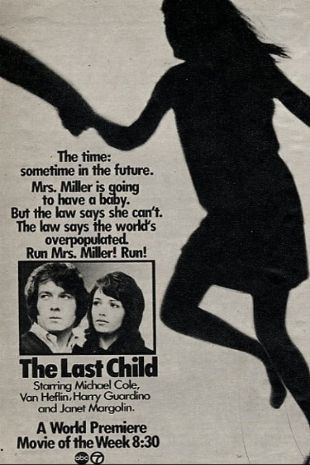One of the more provocative made-for-television movies (originally shown on ABC's "Movie of the Week") of its era, The Last Child is a chase thriller with a cautionary message about birth control thrown in: Use it now on a thoughtful, voluntary basis or it may be mandatory in the future. Although somewhat far-fetched as a story in a country as conservative on this subject as the United States is, the topical political content of this movie is nicely integrated into a competently executed thriller directed by John Llewellyn Moxey (The Night Stalker, Circus of Fear, Horror Hotel). One reason it works so well is that the screenwriters have used the shape of a then real-life controversy as the model and even the mold for the background details and key dramatic elements of this film. The depiction of a country split by the Population Control Laws, which requires that no couple can have more than one child, and no one over 65 can receive life-saving drugs or medical treatment, calls to mind the struggle in homes, the streets, and our public institutions over the Vietnam War, which was still going full-tilt in 1971. Michael Cole (ex-Mod Squad) and Janet Margolin (Woody Allen and Frank Perry alumni) and their struggle to escape to Canada, the pockets of resistance to the federal government's policies and laws (especially in some states, such as that represented by Van Heflin's former U.S. Senator), and the lingering resentment over the law, all call to mind aspects of the split in the country over Vietnam (it is easy to forget that it was illegal to knowingly harbor or aid a draft-dodger in any way, and that men of draft age trying to enter Canada for any reason were immediately suspect in the eyes of many officials). It may not be in a league with either film version of 1984 or Truffaut's Fahrenheit 451, but The Last Child deserves credit for embracing what was then (and remains still, 30-plus years later) a divisive and controversial issue, and one that would have been unthinkable as part of mainstream entertainment even a couple of years earlier.

The Last Child (1971)
Directed by John Llewellyn Moxey
Genres - Drama, Science Fiction |
Sub-Genres - Chase Movie |
Release Date - Oct 5, 1971 (USA - Unknown), Oct 5, 1971 (USA) |
Run Time - 73 min. |
Countries - United States |
MPAA Rating - NR
Share on